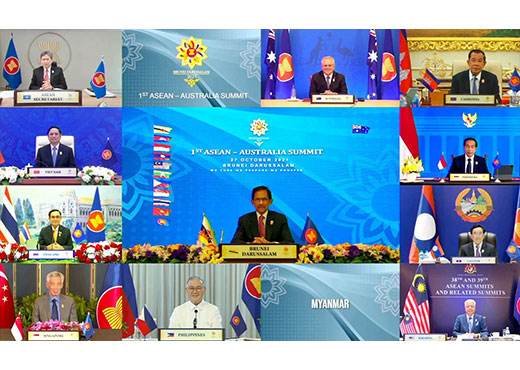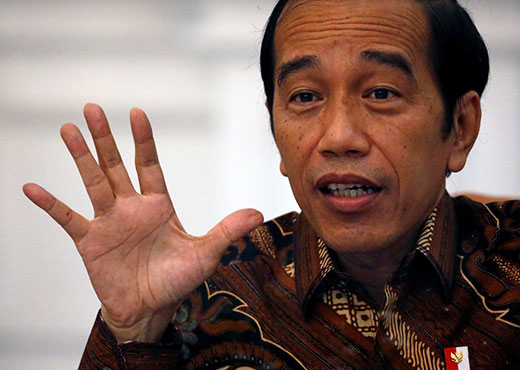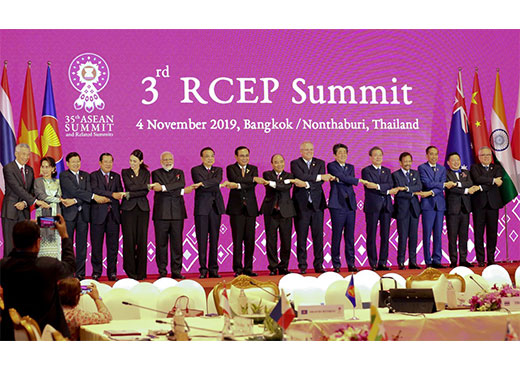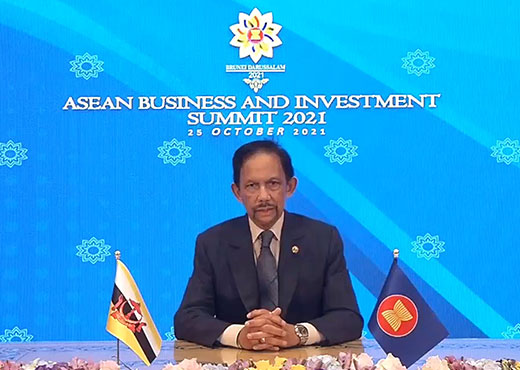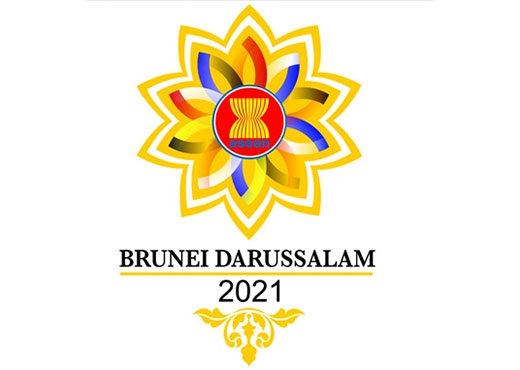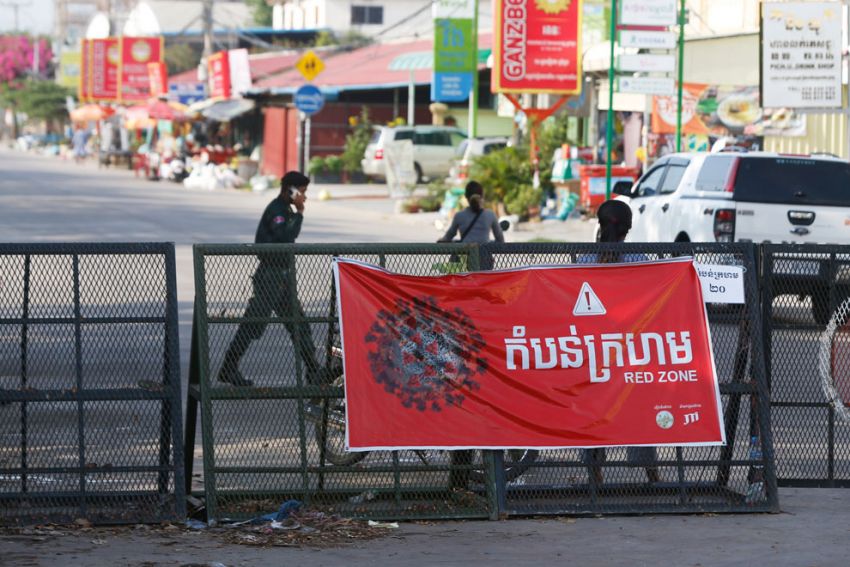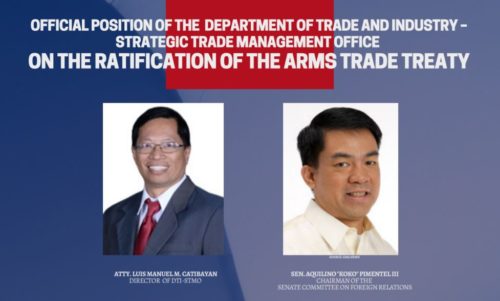BANDAR SERI BEGAWAN – Australia and ASEAN agreed on Wednesday to establish a “comprehensive strategic partnership”, a sign of Canberra’s ambition to play a bigger role in the region.
Announced after the ASEAN-Australia Summit, the pact would further strengthen Australia’s diplomatic and security ties in a fast-growing area that has become a strategic battleground between major powers in the region.
Prime Minister Scott Morrison said Australia would invest AUD$154 million in projects in Southeast Asia on health and energy security, counter-terrorism, fighting transnational crime, plus hundreds of scholarships.
“This milestone underscores Australia’s commitment to ASEAN’s central role in the Indo-Pacific and positions our partnership for the future,” he said in a joint statement with Foreign Minister Marise Payne. “Australia supports a peaceful, stable, resilient, and prosperous region, with ASEAN at its heart.”
Brunei, serving as chair of ASEAN, said the agreement “marked a new chapter in relations” and would be “meaningful, substantive and mutually beneficial”.
Date of Release: 27 October 2021
Read the full article here.
BANDAR SERI BEGAWAN – Indonesian president Joko Widodo called for immediate implementation of the ASEAN Travel Corridor, a regional plan that will help restart safe travel and accelerate Southeast Asia’s economic recovery.
Speaking at the ASEAN Business and Investment Summit on Monday, the president said vaccinated travel lanes must be established, as well mutual recognition of vaccine certificates.
“If all ASEAN countries immediately facilitate the safe mobility of people, the wheels of economy shall soon run again,” he said in his virtual keynote address.
Jokowi, as he’s popularly known, said the region has some of the strictest COVID-19 curbs in the world, and that it was time to ease restrictions.
“According to UN-WTO, the level of restrictions in Southeast Asia is the highest in the world, reaching 82 percent.
In a statement issued Monday night, the Ministry of Finance and Economy (MoFE) said Brunei deposited the instrument of ratification with the ASEAN Secretary-General on October 11.
“Brunei Darussalam’s timely ratification of the RCEP agreement signals our strong commitment to support the region’s post-pandemic recovery efforts, strengthening our economic and trade linkages, creating new opportunities for our businesses as well as support for an open, inclusive, rules-based multilateral trading system,” the ministry said.
The ASEAN-led trade agreement includes all 10 members states, as well as five of its major trading partners: Australia, New Zealand, Japan, China and Korea.
The 15 member countries account for about 30 percent of the world’s population and 30 percent of global GDP (US$26.2 trillion), making it the biggest trade bloc in history.
Date of Release: 12 October 2021
Read the full article here.
Brunei’s ASEAN Business Advisory Council (ASEAN-BAC) has initiated a regional skilling programme to increase the digital competency of ASEAN’s workforce in the wake of the COVID-19 pandemic.
Harnessing Impact with Resilient Employability Digitally (HIRED) will operate as a virtual training and mentorship platform and will be a legacy project under Brunei’s ASEAN chairmanship in cooperation with the ASEAN Future Workforce Council (AWFC).
ASEAN-BAC Chair YB Siti Rozaimeriyanty DSLJ Rahman launched HIRED at the ASEAN Business and Investment Roundtables: Skills for a Digital Age on September 29.
HIRED’s human capital development aspirations target unemployment, reskilling and upskilling for the ASEAN workforce to be more competitive in the fourth industrial revolution. Graduates, employees and employers will be eligible to participate in the programme.
Date of Release: 20 October 2021
Read the full article here.
Continued cooperation between the public and private sectors within ASEAN and its dialogue partners are needed for the region’s recovery in the wake of the COVID-19 pandemic, said His Majesty the Sultan and Yang Di-Pertuan of Brunei Darussalam.
The monarch, who is this year’s ASEAN Chair said in the opening keynote of the ASEAN Business and Investment Summit (ABIS) last Monday that his country’s chairmanship has put forward 13 priority economic deliverables (PEDs) focusing on recovery, digitalisation and sustainability.
These deliverables are being initiated alongisde the ratification of the world’s largest free trade agreement, the Regional Comprehensive Economic Partnership (RCEP) – which includes all 10 ASEAN member states.
In the coming years, His Majesty said that the ASEAN Economic Community Blueprint 2025 will be a “beacon” to further the “aspirations of our businesses and expanding their global reach”.
Date of Release: 27 October 2021
Read the full article here.
ASEAN has made a good progress in advancing ASEAN community-building efforts while at the same time, addressing the COVID-19 pandemic, His Majesty Sultan Haji Hassanal Bolkiah Mu’izzaddin Waddaulah ibni Al-Marhum Sultan Haji Omar ‘Ali Saifuddien Sa’adul Khairi Waddien, Sultan and Yang Di-Pertuan of Brunei Darussalam said in a titah chairing the 38th and 39th ASEAN Summit and Related Summits held virtually via video conference from Baitul Mesyuarah, Istana Nurul Iman yesterday.
His Majesty also emphasised on ASEAN’s unity and collective efforts being vital for the region’s future in a rapidly changing world.
“This year, Brunei Darussalam has emphasised the importance of caring for the people and preparing them for the future. At the same time, ASEAN has continued to empower its youth to be resilient and dynamic by developing their skills and knowledge.”
The monarch shared that ASEAN has established the ASEAN Junior Fellowship Programme, which Brunei Darussalam will fund for the next 10 years. At the same time, ASEAN is also making efforts to ensure the youth will inherit a region that can progress and develop in a
sustainable way.
His Majesty believes that the circular economy model that ASEAN has developed will enhance efficiency and lay the foundations for green recovery.
The monarch also welcomed ASEAN’s work to protect vulnerable groups through the ASEAN Comprehensive Framework on Care Economy to ensure the recovery is inclusive.
His Majesty concluded that these initiatives will strengthen ASEAN’s preparedness and safeguard people’s welfare and development, and enable sustainable prosperity for all.
Date of Release: 4 August 2021
Read the full article here.
The year 2021 has been a challenging one as ASEAN continues to address the impacts of COVID-19, especially with the emergence of new variants. Despite this, ASEAN has continued to make advancements through collective efforts under the theme ‘We Care, We Prepare, We Prosper’.
His Majesty Sultan Haji Hassanal Bolkiah Mu’izzaddin Waddaulah ibni Al-Marhum Sultan Haji Omar ‘Ali Saifuddien Sa’adul Khairi Waddien, Sultan and Yang Di-Pertuan of Brunei Darussalam, as ASEAN Chairman for 2021, said this in a titah at the closing of the 38th and 39th ASEAN Summits and Related Summits held virtually from Istana Nurul Iman yesterday.
His Majesty welcomed the adoption of inclusive and cross-pillar strategies to further advance ASEAN’s community-building efforts embodied in the ASEAN Shield initiative, by improving institutional coordination to enhance preparedness and response to future emergencies and disasters.
ASEAN has also stepped up efforts to respond to and recover from COVID-19, including the procurement of vaccines for its people.
The monarch highlighted cooperation to address mental health and nurture a care economy for the protection and welfare of the people of ASEAN, which are important building blocks to realise the ASEAN Community Vision 2025 and beyond.
“ASEAN has laid the foundations to welcome the future with confidence and resilience by adopting the Consolidated Strategy on the Fourth Industrial Revolution for ASEAN,” His Majesty said.
His Majesty noted that leaders had productive discussions on the current state and future direction of the region, and considered ways to further enhance relations with external partners.
To safeguard the region’s progress and development, ASEAN has invested in the youth as its most precious resource.
The monarch highlighted the establishment of the ‘ASEAN Junior Fellowship Programme’ to build an understanding and appreciation of ASEAN among junior officials, ensuring the association remains relevant. Brunei Darussalam will sponsor the programme for the next 10 years.
Date of Release: 29 October 2021
Read the full article here.
The Ministry of Industry, Science, Technology & Innovation (MISTI) will organize the official launch of “KhmerSME” – the National Digital Information Platform for Micro, Small and Medium Enterprises (www.khmersme.gov.kh). The event will be held on 28th October 2021 at 09:00 presided over by His Excellency Kitti Settha Pandita CHAM Prasidh, Senior Minister & Minister of Industry, Science, Technology & Innovation, and the German Ambassador to Cambodia, His Excellency Christian Berger. The event will be attended by relevant ministries, development partners and stakeholders.
The Ministry of Industry, Science, Technology & Innovation has initiated the development of “KhmerSME” with the Deutsche Gesellschaft für Internationale Zusammenarbeit (GIZ). KhmerSME is a Digital Information Platform allowing an opportunity to Micro, Small and Medium Enterprises access to information including law & regulation, legislation, technical training, science, technology, and innovation transfer, access to finance and markets, starting a business, incentives for strategic and inclusive business practices, more efficiency and competition. Under the auspices of the German government, implemented by GIZ in collaboration with the Ministry of Industry, Science, Technology & Innovation, this prestigious accomplishment has been achieved. The new information platform is an effective business initiative for small and medium enterprises to build and strengthen their capacities, including enhancing the business dimension from micro to small respectively in production, business, and service to promote effective competition.
The Ministry of Industry, Science, Technology & Innovation strongly believes the establishment of the “KhmerSME” website will accelerate the capacities and development of micro, small and medium enterprises in Cambodia to become a driving force and thereby contribute to resilient economic growth and social development.
In this regard, you and all national and international press are invited to watch live the virtual, official launch of the “KhmerSME” on October 28th, 2021, at 9:00 am via the Ministry of Industry, Science, Technology & Innovation’s Facebook Page (https://www.facebook.com/Ministry-of-Industry-Science-Technology-Innovation).
Source: https://www.facebook.com/sme.department.misti
Prime Minister Hun Sen has announced that all official events will resume in November while schools, factories, markets and other establishments will no longer be closed even if there is an outbreak of Covid-19.
In case of an outbreak, he explained, infected persons will be admitted to treatment facilities and the establishments will just be disinfected and allowed to resume operations.
Speaking at the Council of Ministers on October 22, Hun Sen said the Covid-19 situation in Cambodia has improved significantly with far less daily infections and deaths. This, he said, has allowed for gradual resumption of economic activities in the lead-up to full reopening of the country.
As for official events, the prime minister said he will personally go to the National Assembly next week to attend its plenary seesion on the passage of the draft amendments to several articles of the Constitution aiming to mandate single citizenship for the nation’s top office holders.
He will also preside over the inauguration of the new headquarters of the Ministry of Land Management, Urban Planning and Construction on November 8, followed by the inauguration of the Stung Trang-Kroch Chhmar Cambodia-China Friendship Bridge linking Kampong Cham province’s Stung Trang district to Tbong Khmum province’s Kroch Chhmar district.
For full article, please read here
Author: Mom Sokunthear
Source: The Phnom Penh Post
Publication date: 22 October 2021
Strategic Trade Management Office (STMO) Director Atty. Luis Manuel Catibayan addressed the Senate Committee on Foreign Relations during the deliberation on Arms Trade Treaty (ATT) held last 2 September 2021.
The meeting was chaired by Senator Aquilino “Koko” Pimentel and attended by relevant government agencies, such as the Department of Foreign Affairs (DFA), Office of the Special Envoy on Transnational Crime (OSETC), Philippine National Police (PNP), the Department of National Defense (DND), and the STMO.
The ATT regulates the international trade in conventional arms and seeks to prevent and eradicate its illicit trade and diversion. The Philippines has signed the treaty on September 26, 2013, but has yet to ratify it.
“The STMO fully supports the ratification of the ATT,” Director Catibayan stated. “Being a State Party to the treaty will allow the Philippines to demonstrate its commitment in the proper management of conventional arms and boost its reputation as a safe trading environment.”
As ratification will legally bind the country to comply, Director Catibayan noted that Republic Act No. 10697, otherwise known as the Strategic Trade Management Act (STMA), already covers a significant part of the requirements under the ATT, particularly on the establishment of a national control system and a national control list.
The STMO also allayed industry concerns that the ATT will impose controls that will result in denials of arms import to the Philippines. Concurring with the position of the DND that “the decision to allow or deny the import of arms is based on the criteria and discretion of the exporting state,” Director Catibayan said, “Ratification of the ATT assures exporters worldwide that the Philippines has national controls consistent with global standards. It will not hamper but rather facilitate the trade of conventional arms.”
The Director further highlighted the efforts being made by the STMO and the PNP-Firearms and Explosives Office in easing the regulatory burden of its stakeholders. Both offices are currently formalizing an agreement on the jurisdiction of regulated items as well as looking into applying the same risk-assessment criteria in its processes.
“We at the STMO envision the Philippines as one of the leading figures in implementing the ATT and other international instruments on conventional arms in the region. By setting an example, we hope to encourage our Asian neighbors to ratify the treaty and to further work together in maintaining international peace and security,” Director Catibayan affirmed.
The full intervention of Director Catibayan may be accessed through the following link. ♦
Original Date of Release: 14 October 2021
For the source of the article, please click here.



